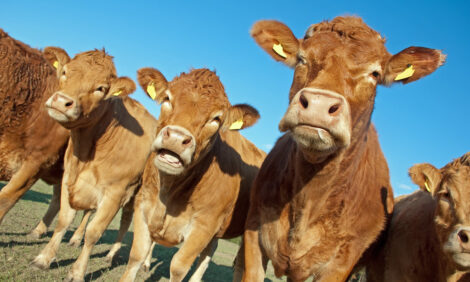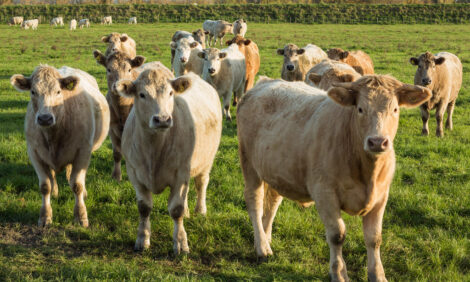



Poultry, Cattle Farming to Benefit from New Funding
UK - The BBSRC has recently awarded a £1.1M grant to a research and industrial collaboration led by Moredun Research Institute to investigate the role of Chlamydia-like organisms as a potential cause of reproductive failure in dairy cattle in the UK.The research collaboration involves scientists from the Moredun Research Institute and the Royal Veterinary College London, in partnership with Pfizer Animal Health, who are co-funding the work, and DairyCo.
Reproductive failure in cattle is one area of great concern to the agricultural sector, as it has a major impact on productivity in UK cattle herds. While there are many factors contributing to reduced rates of reproduction in livestock systems, infection plays a key role, with 77 per cent of diagnosed cases of bovine foetal death reported as resulting from infectious causes. However, diagnosis of the infectious causes of pre-natal death in cattle is poor, with 80 per cent of cases remaining undiagnosed. This may be explained in part by a failure to detect the presence of other unidentified disease causing organisms.
In recent years, there has been an increase in the identification of a group of new emerging bacterial organisms that are found in the environment and have been shown to be associated with a variety of conditions in humans, such as pneumonia and miscarriage. These organisms, which share similar biological characteristics to Chlamydia species that are known to cause a broad range of infections in humans and animals, such as sexually-transmitted infections, pneumonia, blindness and foetal death, are referred to as Chlamydia-like organisms. These Chlamydia-like organisms are also increasingly becoming recognized as potential disease causing organisms of livestock, being particularly associated with the pre-natal death of calves. Indeed, they have been found in over a quarter of the cases analyzed in the UK, and thus could account for some of the 80 per cent unaccounted, undiagnosed cases reported by DEFRA.
The lead scientist in the research collaboration, Dr David Longbottom from Moredun is very excited about starting the new research project, he commented: "We plan to follow up our preliminary studies to investigate the presence of these Chlamydia-like organisms on dairy farms across the UK, determine how they may be transmitted to cattle from the environment and find out how the pathogen affects reproductive performance."
The team at the Royal Veterinary College London, led by Prof Javier Guitian, will determine which pathogens are present in UK dairy cattle experiencing poor reproductive performance, while the team at Moredun will isolate the Chlamydia-like organisms for characterisation and to determine their role in disease.
The team hope that this three year project will greatly increase our understanding of the disease causing potential and role of this group of emerging bacteria in cattle reproduction. The outcomes will lead to improved diagnoses of cattle reproductive failure, inform and educate the industry to the presence of these organisms, lead to improved management systems and determine whether vaccination may be an option to control the disease.
Moredun Research Institute leads new BBSRC-funded project to investigate the development of a vaccine to control poultry red mite
Infestation of hen houses with the poultry red mite is a major health concern of the European poultry industry with significant economical losses. The mites live, off-host, in inaccessible areas of the cages during daylight and emerge during darkness to feed on the hens, biting through the skin to feed on blood. Infestation with these mites has important animal welfare implications including anaemia, feather-pecking and an increased incidence of cannibalism, thus having a significant impact on productivity.
The BBSRC has recently awarded a £0.55M research grant to Moredun scientists in collaboration with Pfizer Animal Health to develop a vaccine to help protect hens against these blood sucking mites.
Dr Alasdair Nisbet who is heading the project at Moredun commented, "Controlling mite populations is now a major problem, with most pesticides affording only limited or short-lived reduction in the population of mites. There is also the issue of development of drug resistance and environmental contamination which means there is an urgent need to develop alternative control strategies."
The team's approach is to determine whether it might be possible to vaccinate laying hens using specific extracts of the mites thus inducing an immune response in the hens that will attack and kill the mites when they take a blood meal from an immunized hen.
Dr Nisbet went on to explain, "Our goal is to identify the bits of the mite that will induce the best immune responses in the hens and produce large quantities of these using recombinant technologies to enable large scale vaccination trials to take place. Preliminary work at Moredun has shown that a vaccination approach is a feasible option to control red poultry mite and we are really excited about progressing this work."
Professor Douglas Kell, BBSRC Chief Executive, said, "Diseases in farmed animas are a serious animal welfare and food security issue. These new projects looking at Chlamydia-like organisms in cows and red mites in poultry highlight the vital role of bioscience research in ensuring farmed animals have the best possible welfare standards, as well as reducing the significant economic losses caused by reduced productivity."
TheCattleSite News Desk



